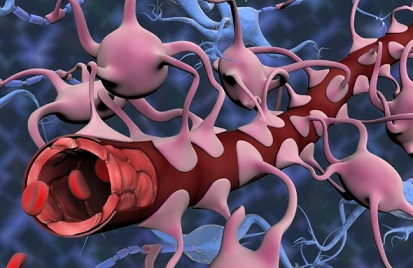Nikhil Prasad Fact checked by:Thailand Medical News Team Jul 02, 2024 1 year, 6 months, 2 days, 21 hours, 45 minutes ago
Medical News: New Brain Cells Found to Protect the Blood-Brain Barrier
Scientists at the Perron Institute- Australia and The University of Western Australia have made a groundbreaking discovery in the field of neuroscience. They have identified a new type of brain cell that plays a critical role in maintaining the integrity of the blood-brain barrier (BBB). This barrier is essential for protecting our brains from harmful substances while allowing vital nutrients to pass through.
 Dmp1-expressing brain cells regulate the blood-brain barrier
Dmp1-expressing brain cells regulate the blood-brain barrier
The study findings covered in this
Medical News report, reveal how these newly discovered cells, known as Dmp1-expressing astrocytes, could lead to new treatments for brain disorders and age-related cognitive decline.
Understanding the Blood-Brain Barrier
The blood-brain barrier is a network of blood vessels that acts as a gatekeeper for the brain. It ensures that only essential nutrients can enter the brain while keeping out toxins and pathogens. This barrier is crucial for maintaining a stable environment for the brain's neurons, which are highly sensitive to changes in their surroundings.
However, as we age or in the presence of certain brain disorders, the BBB can become less effective. This breakdown in the barrier's function can lead to a range of neurological problems, including Alzheimer’s disease and Parkinson’s disease. Understanding how to maintain or restore the BBB's integrity is a significant step toward addressing these issues.
The Role of Astrocytes
Astrocytes are a type of glial cell in the brain that support neurons and help maintain the BBB. They are highly diverse in appearance and function, adapting to different roles depending on their location in the brain. One of their key functions is to wrap around blood vessels with their cellular extensions, known as endfeet, and help regulate the BBB.
The new study has identified a subset of astrocytes that express a protein called dentin matrix protein 1 (DMP-1), typically found in bone tissue. These Dmp1-expressing astrocytes have a unique ability to transfer mitochondria - the energy-producing components of cells - to the endothelial cells that line the blood vessels of the BBB.
Mitochondrial Transfer: A Key Mechanism
Mitochondria are essential for cell function, providing the energy required for various cellular processes. The researchers found that Dmp1-expressing astrocytes transfer mitochondria to endothelial cells, which is crucial for maintaining the BBB. This transfer helps to keep the endothelial cells healthy and functioning properly, ensuring the barrier remains intact.
When the function of these astrocytes is impaired, mitochondrial transfer is reduced, leading to a compromised BBB. This can result in leakage, where harmful substances can enter the brain, potentially causing damage.
The Importance of Mfn2
The study also highlighted the role of a protein called Mitofusin 2 (Mfn2), which is involved in the fusion of mitochondria and their interaction with other cellular components. In the genetically modified mice used in the study, the deletion of the Mfn2 gene in Dmp1-expressing astrocytes inhibited mitochondrial transfer and caused the BBB to become leaky.
This finding is significant because it shows that the age-related reduction in Mfn2 can lead to a decrease in mitochondrial transfer efficiency. This contributes to the breakdown of the BBB as we age, making the brain more vulnerable to toxins and pathogens.
Implications for Treatment
The discovery of Dmp1-expressing astrocytes and their role in maintaining the BBB opens up new avenues for treatment. By targeting these cells and enhancing their mitochondrial transfer capabilities, it may be possible to develop therapies that protect or restore the BBB in aging individuals and those with neurological disorders.
This could have far-reaching implications for conditions such as Alzheimer's disease, Parkinson's disease, and multiple sclerosis, where BBB breakdown is a contributing factor.
Future Research Directions
Further research is needed to fully understand the mechanisms by which Dmp1-expressing astrocytes transfer mitochondria and how this process can be enhanced or restored. Scientists are also interested in exploring the potential for mitochondrial transplantation as a therapeutic strategy.
By improving the efficiency of mitochondrial transfer and ensuring the vitality of transferred mitochondria, researchers hope to develop treatments that can effectively maintain BBB integrity throughout life.
Conclusion
The discovery of Dmp1-expressing astrocytes and their role in regulating the blood-brain barrier is a significant breakthrough in neuroscience. These cells offer new insights into how the BBB can be maintained and restored, providing hope for new treatments for a range of neurological disorders.
As research continues, the potential for targeting these cells to enhance mitochondrial transfer and protect the BBB could revolutionize the way we approach the treatment of brain diseases and age-related cognitive decline. This exciting discovery underscores the importance of understanding the complex cellular interactions that underpin brain health and opens up new possibilities for maintaining brain function in health and disease.
The study findings were published in the peer reviewed journal: Science Advances.
https://www.science.org/doi/10.1126/sciadv.adk2913
For the latest about the Blood-Brain barrier, keep on logging to Thailand
Medical News.
Read Also:
https://www.thailandmedical.news/news/australian-study-finds-that-those-with-post-covid-cognitive-issues-are-likely-to-suffer-from-blood-brain-barrier-disruption-and-glutamatergic-excitoto
https://www.thailandmedical.news/news/researchers-discover-way-to-allow-drugs-to-penetrate-through-the-blood-brain-barrier
